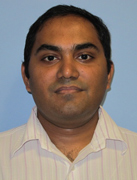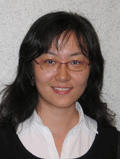- Republished with permission of emagination, a School of Engineering electronic publication
Five engineering doctoral students who aspire to careers in an academic setting have been selected to receive Koerner Family Fellowships, which confer $10,000 to each. The Koerner Family Fellowships are made possible thanks to the generosity of Professor Robert and Mrs. Paula Koerner and their children – Dr. Michael Koerner, Dr. George Koerner and Ms. Pauline Koerner.
 The 2011-12 recipients were nominated by their departments and chosen by a School committee. They are:
The 2011-12 recipients were nominated by their departments and chosen by a School committee. They are:
- Lance Fiondella, Computer Science & Engineering (advisor: Swapna Gokhale). Research interests: software reliability and performance, homeland security studies, and computer programming literacy.
- Kathryn Gosselin, Mechanical Engineering (advisor: Michael Renfro). Research interests: ignition limits at atmospheric and low pressures, with applications in the operation of afterburners in military jet engines and other types of combustion engines.
- Chad Johnston, Civil & Environmental Engineering (advisor: Marisa Chrysochoou). Research interests: contaminant mobility in soil and groundwater systems, for the development of remediation strategies and evaluating public health risks. Particular interest in chromate, a toxic metal and potential carcinogen.
- Vincent Palumbo, Chemical, Materials & Biomolecular Engineering (advisor: Bryan Huey). Research interests: methods of enhancing the blast and fire resistance of the nation’s infrastructure, including bridges, buildings, tunnels, and the like.
- Ernesto Suarez, Electrical & Computer Engineering (advisor: Faquir Jain). Research interests: tunnel insulators for three-state logic field effect transistors (FETs) and nonvolatile memory devices, with a focus on radiation hardened devices.
Dean of Engineering Mun Y. Choi, said “Professor and Mrs. Koerner have been stalwart supporters of higher education for more than four decades. Through their generous gift, a group of highly-talented Ph.D. students will pursue advanced studies in trans-disciplinary topics in engineering.”
Dr. Koerner is the H.L. Bowman Professor Emeritus of Civil, Architectural & Environmental Engineering at Drexel University and the Director of the Geosynthetic Research Institute. Throughout his over 40-year career, Dr. Koerner has established a sterling reputation as a technological innovator, educator and engineering practitioner. He has authored hundreds of journal papers and books on topics spanning soil deformation, waste containment facility construction, and the use of geosynthetics in erosion, filtration and drainage control. In recognition of his accomplishments in the design and use of geosynthetic materials in the constructed environment, he was elected to the National Academy of Engineering (NAE) in 1998.




